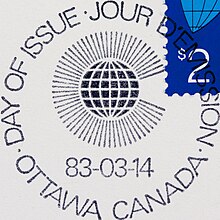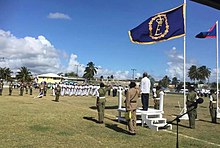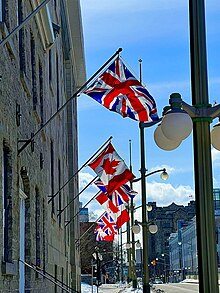|
Commonwealth Day
Commonwealth Day is the annual celebration of the Commonwealth of Nations, held on the second Monday in March. While the date holds some official status in select member states of the Commonwealth, observances of the date are not uniform across the Commonwealth, and the date is not celebrated as a public holiday in most Commonwealth countries.[note 2] The event traces its origins to Empire Day, an event initially conceived to celebrate the British Empire. It was originally observed on Queen Victoria's birthdate, May 24th, or the last weekday before it. In the latter half of the 20th century, the celebration's focus shifted towards emphasising the modern Commonwealth of Nations, with the event being renamed Commonwealth Day in 1958, and its date moved to the second Monday in March in 1977. Commonwealth Day is typically marked by a Commonwealth Day message made by the Head of the Commonwealth, as well as additional statements from the Commonwealth Secretary-General. Inter-denominational observances are also held in cities across the Commonwealth, including one led by the Head of the Commonwealth at Westminster Abbey in London and attended by the Commonwealth Secretary-General. Flag-raising ceremonies for the flag of the Commonwealth of Nations are also held in Commonwealth countries. The flags of Commonwealth member states are flown at select locations in the United Kingdom, while the Royal Union Flag is flown at federal installations in Canada. HistoryThe idea of observing one day each year as a public holiday throughout the British Empire was first suggested in 1894 and 1895 by Thomas Robinson, the Royal Colonial Institute's honorary secretary at Winnipeg in Canada. Taking up Robinson's suggestion, the Royal Colonial Institute's London council addressed a petition to the Queen Victoria in July 1894 declaring that, whereas other nations had annual days for national celebration, the British Empire had no such day, and proposing that the Queen's birthday should be set aside for the purpose. In a reply the British prime minister, Archibald Primrose, 5th Earl of Rosebery, stated that it was a matter not for the government but for the community and pointed out that government departments already kept the Queen's birthday as a holiday.[1][2] Other early advocates for the adoption of an "Empire Day" as a patriotic holiday include the British Empire League.[3] The idea to hold an "Empire Day" as a day that would "remind children that they formed part of the British Empire" gained support in the 1890s,[4] and on the initiative of Clementina Trenholme in 1898, was first introduced in Ontario schools on the last school day before 24 May, Queen Victoria's birthday.[1][2] By the end of the 19th century, Empire Day was also celebrated in Cape Colony before the Second Boer War and thereafter throughout the Union of South Africa.[1][2][5] Empire Day was introduced in the United Kingdom in 1904 by Reginald Brabazon, 12th Earl of Meath, 'to nurture a sense of collective identity and imperial responsibility among young empire citizens'.[6]  After the death of Queen Victoria on 22 January 1901, her birthday, 24 May, was celebrated from 1902 as Empire Day, though not officially recognised as an annual event until 1916.[4][7][deprecated source?] In schools, morning lessons were devoted to "exercises calculated to remind (the children) of their mighty heritage".[8] The centrepiece of the day was an organised and ritualistic veneration of the Union flag. Schoolchildren were given the afternoon off, and further events were usually held in their local community.[9] After the First World War, the jingoism was toned down in favour of sombre commemoration in the festival.[9] In 1925, 90,000 people attended an Empire Day thanksgiving service held at Wembley Stadium as part of the British Empire Exhibition.[10] However, Empire Day became more of a sombre commemoration in the aftermath of World War I, and politically partisan in the United Kingdom as the Labour Party passed a resolution in 1926 to prevent the further celebration of Empire Day.[9]
Change in name and dateAfter World War II, the event fell into rapid decline. On 18 December 1958, Prime Minister Harold Macmillan announced in Parliament that the name of Empire Day would be changed to Commonwealth Day.[9][11]  In 1973, the National Council in Canada of the Royal Commonwealth Society submitted a proposal to Canadian Prime Minister Pierre Elliot Trudeau that Commonwealth Day should be observed simultaneously throughout the Commonwealth of Nations. The proposal was included in the Canadian items for inclusion in the agenda for the 1975 Commonwealth Heads of Government Meeting. After the meeting, it was agreed that the Commonwealth Secretariat would select a date with no historical connotations so that the entire Commonwealth could use it as a date to celebrate Commonwealth Day. At a meeting in Canberra in May 1976, senior Commonwealth officials agreed on a new fixed date for Commonwealth Day, the second Monday in March.[12] The second Monday of March was selected by Commonwealth leaders as it was a day when most schools would be in session, facilitating student participation in several Commonwealth-related activities, including mini-Commonwealth Games, simulated Commonwealth Heads of Government Meeting, and studies and celebrations on the geography, ecology, products or societies of other Commonwealth countries.[13] Observance Commonwealth Day is held on the second Monday in March.[14][15] However, there is not a uniform observance of the day worldwide.[12] On the day, the Head of the Commonwealth broadcasts a message throughout the entire Commonwealth of Nations. The broadcast is addressed to the people of the Commonwealth, and not to specific governments. Past Commonwealth Day messages by Queen Elizabeth II are themed after an issue of importance to the Commonwealth which she thinks people can have an impact on. In some member states of the Commonwealth, the message is sometimes augmented by an address from a member country's president, prime minister, or another senior minister. The Commonwealth Secretary-General also issues a statement on the day, which is read on the radio or published in some Commonwealth countries.[13] Several cities throughout the Commonwealth host multi-cultural and inter-denominational services to mark the day.[16][17] Flag-raising ceremonies for the flag of the Commonwealth of Nations are also held in several Commonwealth countries.[18] United KingdomOn Commonwealth Day, flags of the member states of the Commonwealth of Nations are flown in Parliament Square and at Marlborough House.[13] The flag of the United Kingdom is flown from UK public buildings on the second Monday in March to mark Commonwealth Day.[19] Flag flying guidelines for the Scottish Government and its related agencies also advises the flying of the flags of the Commonwealth of Nations and Scotland on the date, only if the building has two or more flagpoles.[20]  In London, an inter-denominational service is led by the Head of the Commonwealth at Westminster Abbey. During the service, representatives of Commonwealth countries offer the flags of member states for blessing.[13][21] A reception hosted by the Commonwealth Secretary-General is held after the service.[22] A wreath-laying ceremony to commemorate the sacrifice of Commonwealth soldiers at London's Commonwealth Memorial Gates is attended by the Commonwealth Secretary-General, and is held before the service at Westminster Abbey.[18][23] Several other events, such as the Commonwealth Africa Summit, also take place around the United Kingdom on Commonwealth Day.[24] British Overseas TerritoriesCommonwealth Day was formerly celebrated as a public holiday in several British Overseas Territories. The day was observed as a school holiday in British Hong Kong before the handover of the territory from the United Kingdom to China in 1997.[25] The date was also formerly observed as a public holiday in Gibraltar.[26] In 2021, the holiday was moved to February instead of March.[27] In 2022, Commonwealth Day was no longer listed as a public holiday in Gibraltar, with the February public holiday replaced by the Winter Midterm Bank Holiday.[28] Although the event is no longer a public holiday, the Government of Gibraltar continues to mark Commonwealth Day through various events.[29] Australia Commonwealth Day is observed by Australian state governors and the governor-general.[30][31][32] The Commonwealth Day Council of New South Wales holds an annual lunch in the presence of its patron, the governor, at Parliament House, Sydney.[33][34] BahamasIn The Bahamas, Commonwealth Day school assemblies involving flag-raising ceremonies are held.[25] Belize In Belize, Commonwealth Day was also known as Sovereign's Day and was formerly celebrated as a public holiday in May. The holiday was originally celebrated in honour of Queen Victoria's birthday, although it was later set aside to recognise and celebrate the importance of being part of the Commonwealth of Nations.[35] In 2021, the Sovereign's Day was removed from the government's official list of public and bank holidays.[36] Canada In Canada, the only official recognition of Commonwealth Day is a federal government stipulation that the Royal Union Flag be flown alongside the flag of Canada at federal installations nationwide where at least two flag poles are present.[37] The stipulation to fly the Royal Union Flag on days including Commonwealth Day, originates from the 1964 parliamentary resolution when the flag of Canada was adopted, which retained the Royal Union Flag as an official symbol in the country to signify its membership in the Commonwealth and allegiance to the Crown.[37][38] From 1898 to 1976, Empire Day/Commonwealth Day was observed on an ad hoc basis in conjunction with Victoria Day, a federal statutory holiday in May that also serves as the sovereign's official birthday in Canada.[12][39] Empire Day/Commonwealth Day was held on the weekday before Victoria Day and was not intended to be a general holiday in itself, but a day to provide schools and civic institutions the opportunity to implement activities and lessons on Canada and the British Empire.[39] In 1977, Commonwealth Day was moved to the second Monday in March, in line with the rest of the Commonwealth of Nations.[12] TuvaluCommonwealth Day is observed as a public holiday in Tuvalu, as legislated in the country's Public Holidays Act.[40] Commonwealth Day themes
See alsoNotes
References
External linksWikimedia Commons has media related to Empire Day.
|
||||||||||||||||||||||||||||||||||||||||||||||||||||||||||||||||||||||||||||||||||||
